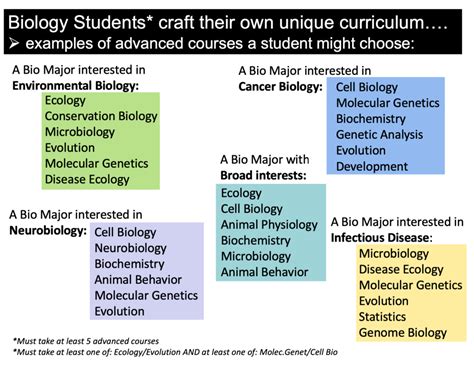Introduction:

Biology encompasses the study of life, from the smallest microorganisms to the intricate systems of living organisms. Aspiring biologists delve into the fascinating realms of cells, genetics, molecular biology, ecology, and evolution. However, the path to becoming a biologist is not without its challenges.
Rigorous Coursework and Intensive Labs:
Biology majors entail a rigorous curriculum that typically includes courses in general biology, cell biology, molecular biology, genetics, biochemistry, and ecology. These courses demand a solid foundation in mathematics, chemistry, and physics. Laboratories are an integral part of biology education, providing hands-on experience with microscopes, molecular techniques, and field research.
Data Analysis and Statistical Interpretation:
Biology heavily relies on data analysis and statistical interpretation. Students must develop proficiency in statistical software and analytical techniques to decipher complex biological datasets. Understanding the nuances of data and drawing meaningful conclusions is crucial for success in biology.
Critical Thinking and Problem-Solving:
Biology majors develop critical thinking and problem-solving skills. They learn to analyze biological phenomena, formulate hypotheses, design experiments, and interpret results. This process fosters intellectual curiosity and the ability to approach complex questions with a scientific mindset.
High-Throughput Data and Computational Biology:
Advancements in technology have led to an explosion in high-throughput data and the emergence of computational biology. Biologists now utilize bioinformatics and computational models to analyze large datasets, identify patterns, and gain insights into biological systems. This area requires proficiency in computer programming and statistical analysis.
Challenges and Time Commitment:
Biology is a comprehensive and demanding major. Students must dedicate significant time to studying, completing assignments, and participating in laboratory work. The workload can be challenging, especially during the early semesters when foundational concepts are being established.
Factors Influencing Difficulty:
The difficulty of biology as a major can vary depending on several factors:
- Individual Learning Style: Some students find biology concepts more intuitive than others.
- Prior Preparation: A strong background in science and mathematics can make biology coursework more manageable.
- Major Specialization: Different biology specializations, such as molecular biology or ecology, have varying levels of difficulty.
- University Curriculum: The rigor of biology programs can differ across universities.
Why Choose Biology?
Despite the challenges, biology is an incredibly rewarding major. It provides students with:
- Intellectual Stimulation: Biology offers a constant stream of new discoveries and challenges that stimulate curiosity and foster intellectual growth.
- Practical Applications: Biological knowledge has far-reaching applications in medicine, biotechnology, agriculture, and environmental science.
- Career Opportunities: Biology graduates are highly sought after in diverse fields, including research, healthcare, education, and industry.
- Contribution to Society: Biologists contribute to our understanding of life and play a vital role in solving global challenges, such as disease, food security, and climate change.
Strategies for Success
To thrive in biology, students can employ the following strategies:
- Develop Strong Study Habits: Establish regular study sessions, prioritize assignments, and seek help when needed.
- Attend Classes and Participate: Active engagement in lectures and discussions enhances understanding and facilitates better retention of information.
- Utilize Lab Resources: Take advantage of laboratory hours, ask questions, and seek guidance from teaching assistants.
- Join Study Groups: Collaborating with peers can provide support, clarify concepts, and improve problem-solving skills.
- Seek Mentorship: Identify faculty members or experienced researchers who can provide guidance, support, and opportunities for research involvement.
Tips and Tricks:
- Break down complex concepts into smaller, manageable chunks.
- Use visual aids, such as diagrams and charts, to visualize biological processes.
- Practice solving problems and interpreting data on a regular basis.
- Don’t be afraid to ask for help from professors or TAs.
- Take advantage of online resources, such as textbooks, videos, and simulations.
- Manage time effectively and prioritize tasks based on importance and deadlines.
Conclusion:
Biology is a challenging but rewarding major that offers a deep understanding of life and ample career opportunities. By embracing the challenges, developing effective strategies, and seeking support, aspiring biologists can navigate the rigors of the field and emerge as knowledgeable and successful professionals.
Tables:
| Table 1: Employment Outlook for Biological Scientists |
|—|—|
| Occupation | Projected Growth (2021-2031) |
| Biological Scientists | 7% |
| Biochemists and Biophysicists | 5% |
| Microbiologists | 6% |
| Zoologists and Wildlife Biologists | 5% |
| Table 2: Median Salaries for Biological Scientists |
|—|—|
| Occupation | Median Annual Salary (2021) |
| Biological Scientists | $95,010 |
| Biochemists and Biophysicists | $92,920 |
| Microbiologists | $104,590 |
| Zoologists and Wildlife Biologists | $90,040 |
| Table 3: STEM Education Statistics |
|—|—|
| Metric | Value |
| Percentage of U.S. High School Graduates Earning a Bachelor’s Degree in STEM | 16% |
| Percentage of U.S. College Students Majoring in STEM | 21% |
| Percentage of U.S. STEM Graduates Working in STEM Jobs | 76% |
| Table 4: Challenges and Motivations for Biology Students |
|—|—|
| Challenge | Motivation |
| Rigorous coursework | Intellectual stimulation, career opportunities |
| Data analysis and statistical interpretation | Developing critical thinking and problem-solving skills |
| High-throughput data and computational biology | Keeping pace with technological advancements |
| Time commitment and workload | Desire to make a meaningful contribution to society |
| Lack of diversity in STEM fields | Promoting equity and inclusion in science |
